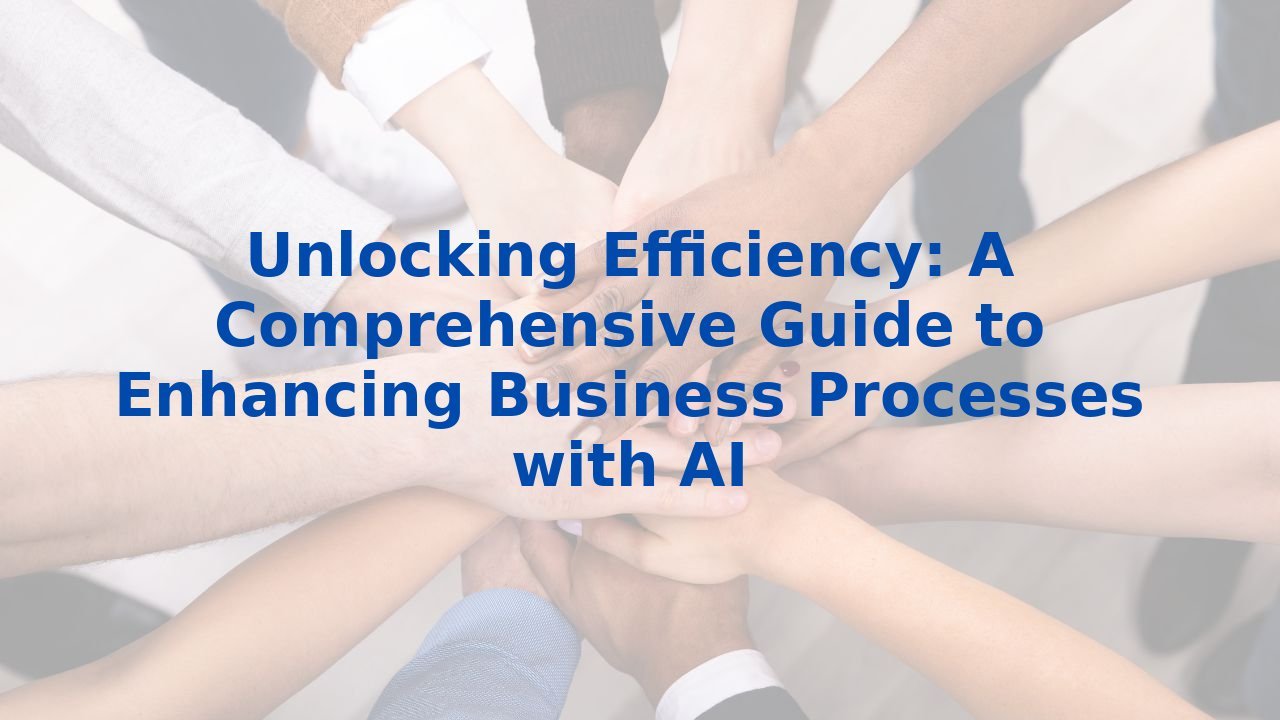Unlocking Efficiency: A Comprehensive Guide to Enhancing Business Processes with AI
Unlocking Efficiency: A Comprehensive Guide to Enhancing Business Processes with AI
Introduction
In a world where speed and efficiency dictate success, organizations are relentlessly on the pursuit of better processes. The answer to achieving unparalleled efficiency lies in Artificial Intelligence (AI). With AI, businesses can streamline operations, automate mundane tasks, and gain data-driven insights that guide strategic decisions. This guide will explore how AI enhances key business processes and the transformative benefits of embracing this potent technology.
Understanding AI Process Optimization
AI process optimization marries cutting-edge technology with business acumen. By deploying AI and machine learning, organizations can analyze complex data, automate repetitive tasks, and empower teams to make informed choices. This powerful combination is not merely about increasing activity; it’s about elevating the quality of work, reducing errors, and dramatically enhancing productivity.
Key AI Use Cases in Business Process Management
1. Process Discovery and Mapping
At the very heart of operational efficiency is process discovery. AI employs techniques like process mining and pattern recognition to illuminate and accurately map a company’s existing workflows. This not only keeps documentation precise but also helps identify areas ripe for enhancement. By uncovering hidden inefficiencies and bottlenecks, AI lays the groundwork for optimized operational models.
2. Process Automation
Why should humans spend time on tedious tasks? AI excels in automating labor-intensive procedures. From document processing to data entry, AI bots can effectively handle a multitude of tasks that once required human intervention. The result? A liberated workforce that can focus on innovation and strategic initiatives rather than getting bogged down in minutiae.
3. Decision-Making and Predictive Analytics
AI transforms decision-making from guesswork into a data-driven science. With predictive analytics, businesses can identify trends, forecast outcomes, and understand root causes. Imagine analyzing sales data in real-time to spot trends long before they become apparent in monthly reports. This foresight can redefine pricing strategies, enhance inventory management, and strengthen the bottom line.
4. Customer Service and Experience
Your customers are the lifeblood of your business, and AI has a significant role to play in their experience. Chatbots can address basic inquiries around the clock, while AI-driven analysis of customer feedback can unveil unseen opportunities for enhancement. Tailoring responses and interventions based on real-time customer data fosters loyalty and drives satisfaction.
5. Supply Chain Management
In a world where supply chain intricacies can spell success or failure, AI steps in to analyze purchase data instantaneously. It can spot anomalies that hint at emerging issues, such as unexpected spikes in product demand. AI can even trigger automated procurement processes to expedite product replenishment, ensuring that businesses remain nimble and responsive.
Benefits of AI for Business Process Management
1. Improved Efficiency
The immediate payoff of AI integration is improved efficiency. By automating routine tasks, organizations can minimize human error while freeing their talent to engage in higher-value activities. This shift maximizes productivity and fosters a culture of innovation.
2. Enhanced Decision-Making
With a treasure trove of data at their fingertips, organizations can harness AI to make informed decisions quickly. Spotting trends, predicting market shifts, and evaluating operational performance become not just possible, but foundational for long-term success.
3. Real-Time Monitoring and Optimization
Imagine having a real-time view of all your business processes. AI facilitates constant monitoring, enabling the early detection of deviations and unusual activities. This capability empowers teams to act swiftly, optimizing processes on-the-go and preventing small issues from escalating into larger problems.
4. Cost Reduction
At a time when every dollar counts, AI represents a formidable ally in cost reduction. By minimizing reliance on manual labor and streamlining processes, organizations can drastically cut down expenses related to training, overhead, and resource allocation.
The Role of Employee Training in AI Implementation
Even the most sophisticated AI is only as effective as the people wielding it. This is where employee training comes into play. Training ensures that your workforce understands the intricacies of AI technology, which is essential for maximizing its benefits.
1. Understanding AI Capabilities
When employees understand AI’s strengths and limitations, they can utilize it more effectively within their roles, leading to better outcomes.
2. Integration with Existing Systems
Knowledgeable team members can seamlessly integrate AI solutions into established workflows, ensuring smooth operations without significant disruptions.
3. Data Quality and Accuracy
AI thrives on high-quality data. A trained workforce is better equipped to maintain data integrity, which is vital for accurate AI output and insights.
4. Adaptability and Innovation
As technology evolves, so too should your workforce. Training encourages adaptability and empowers employees to leverage AI creatively to uncover new opportunities.
Conclusion
AI is not just a tool; it's a transformative force that can redefine business operations. By understanding its applications and benefits, organizations can unlock new levels of efficiency, make smarter decisions, and reduce costs. However, to truly harness the power of AI, investing in employee training is essential. As the business landscape continues to evolve, the partnership between AI and a well-trained workforce will be key to sustaining success.



